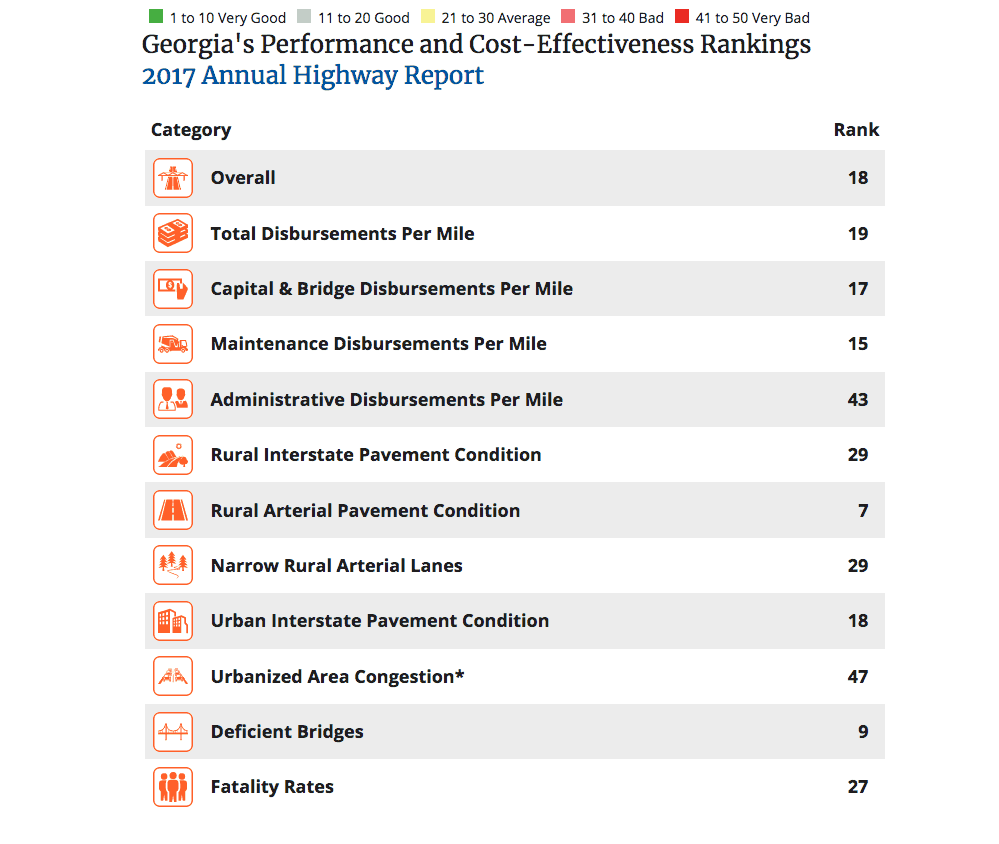In light of the current infrastructure discussions, and with the recent release of the Reason Foundation’s 23rd annual Highway Report, one unique vision for congestion improvement comes out of Georgia: a toll-free, truck-only highway running through one of the most congested corridors in the state.
Atlanta’s local WABE Radio reports that the toll-free highway would stretch 40 miles (65 kilometers) from metro Atlanta to Macon (northbound only). It would give trucks their own separate roadway, which would have its own exits and entrances, John Hibbard, the Georgia DOT’s operations director, said.
4,317 people died in crashes where large trucks were involved in 2016, according to the most recent federal statistics from the National Highway Traffic Safety Administration. A separate highway for trucks could boost safety for both regular cars and freight operators, according to GDOT’s fact sheet on what’s called the I-75 Commercial Vehicle Lanes. The project is “projected to reduce delay on I-75 by 40 percent in 2030” and could also lower maintenance costs on the lanes for passenger cars.
Atlanta-area truckers have shown support for the project. WABE Radio spoke to trucker Afori Pugh, who transports around 20,000 pounds of construction materials on his trips. He thinks a truck-only highway could “unclog a lot of the traffic.”
Georgia governor Nathan Deal also seems to support the project, saying the truck-only highway is “an important part of what our future transportation system should and will look like” in a Georgia Transportation Alliance meeting.
Timothy Brown, Managing Director for Supply Chain & Logistics Institute, tells FreightWaves, “In the case of Georgia, and that stretch, I think it may make sense. The ports are doubling capacity — much of which would flow along that stretch. That stretch also handles Florida to the Midwest travel. And the stretch is now in the Metro Area traffic. So, with so much going on in this pipeline, and trucks having a constraining impact — separating them on that stretch may make sense.”
But critics say the high cost of $1.8 billion is troubling.
Matt Casale is a transportation analyst with the U.S. Public Interest Research Group. His team listed the state’s truck-only lanes among the worst highway projects in America in 2017, saying it “would represent a giveaway to the trucking industry, while undermining a rail-based approach to freight movement in Georgia that is intended to get trucks off the roads.”
The Reason Foundation’s recently released 23rd Annual Highway Report, lists Georgia as 18th overall in the nation in highway performance and cost-effectiveness.

Georgia would ask for federal funds, but if the government doesn’t come through, Deal said the project could still move forward with state money, specifically because of the state’s Transportation Funding Act, passed in 2015. The act is paid for by an increase in fuel taxes.
“It’s really a gamble with the taxpayers’ money,” Casale said. “It’s a lot of taxpayer money, and it’s a lot of money to spend on something that we don’t know is going to work.”
This truck-only project is just one of 11 new projects under what the state calls the Major Mobility Investment Program.
GDOT could choose a general engineering consultant by the end of this year. The consultant would be expected to be in charge of project development and seek public input in the environmental process. Construction could commence by 2025. By 2030, GDOT plans to build more than 300 miles of new lanes.
Stay up-to-date with the latest commentary and insights on FreightTech and the impact to the markets by subscribing.










